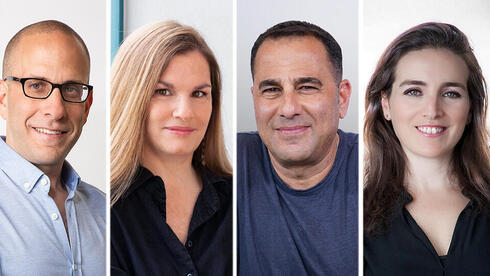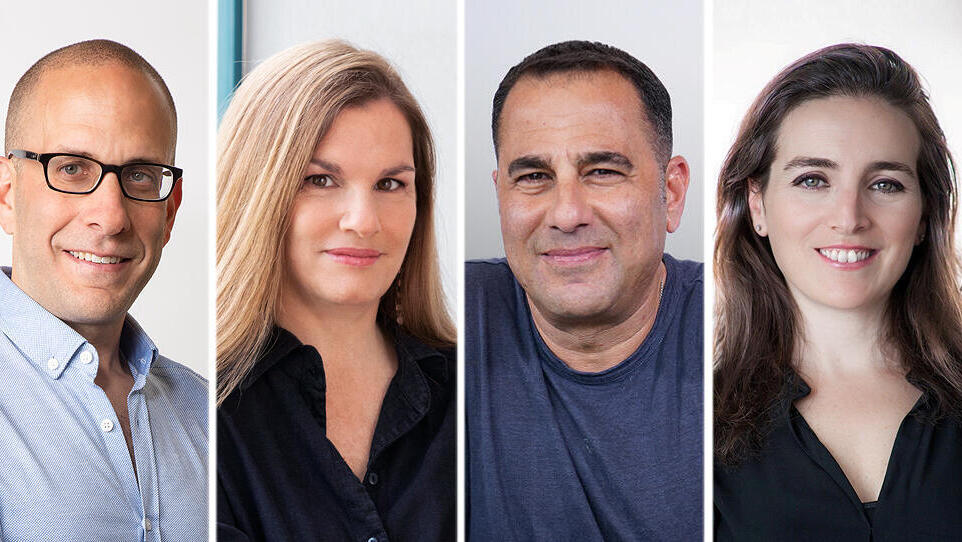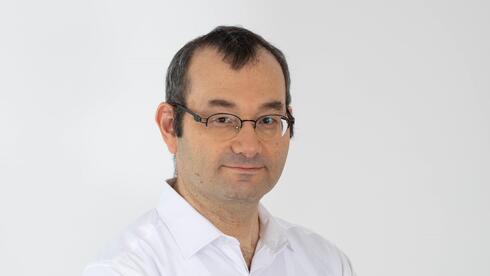
Growth+
"Companies that fail to adapt their DNA to AI will be left behind"
Michal Kissos Hertzog, Shlomi Ben Haim, Vered Raviv-Schwarz, and Asaf Peled discuss how businesses must integrate AI to remain competitive.
"The last two years have forged a new generation of entrepreneurs. Those who survived 2023-2024 learned to work differently: leaner, more focused, and with a deep understanding of the market. Now, as the market reopens, it’s the turn of those who have built true resilience—those who knew how to navigate periods without IPOs, cautious investors, and customers who ask tough questions," said Michal Kissos Hertzog, CEO of Poalim Tech, ahead of the launch of the Growth+ mentoring project.
1 View gallery


From right: Michal Kissos Hertzog, Shlomi Ben Haim, Vered Raviv Schwarz, and Asaf Peled
(Photos: Avigail Uzi, JFrog, Eyal Toueg)
"But 2025 is not just a year of returning to growth; it is a year of changing the rules of the game. If, in the previous decade, startups were measured by their ability to grow quickly, today the question is how necessary they are. In the world of AI First, companies that fail to adapt their DNA to AI will be left behind. In a world where we’re already talking about the Single-Person Unicorn phenomenon—meaning one entrepreneur can reach a billion-dollar valuation with the help of AI—it’s clear that building a large company requires entrepreneurs to think differently. Not just about growth and expansion, but about creating real, irreplaceable value.
"Growth+ was created exactly for this purpose: to build a community that connects experienced entrepreneurs with those who are now building the next big thing. The goal is not to give 'tips,' but to share how to truly survive, when to insist on something, when to change, and how to build a company that the world cannot pass on."
Calcalist and Poalim Tech are launching the Growth+ project for the second year, which will feature one-on-one meetings between the founders of Israel's leading tech companies and entrepreneurs of promising startups. The project aims to advise and provide tools, knowledge, and insights on entrepreneurship, creativity, startup management, and building companies for growth. Registration for startups is open and will close on March 4.
Shlomi Ben Haim, co-founder and CEO of JFrog, and a mentor in the project, said: "When we founded the company, one of the most important things we learned was to surround ourselves with the right people: the founding team, smart investors, and experienced, committed advisors who understand the mission and, more importantly, are there for the entrepreneur. Initiatives like Growth+ promote exactly these parameters—access to knowledge, the right network, and insights that can help avoid costly mistakes. Entrepreneurs who listen to advice in frameworks like Growth+ will save themselves from the pitfalls on the road to success."
Vered Raviv-Schwarz, President and COO of Guesty, and a mentor in the project, said: "Entrepreneurship is difficult, especially in the current period. The macro environment is much tougher than in previous years, and investors who were burned by high valuations in 2021 are now showing caution and skepticism. Raising funds, especially at the seed stage, is harder; investors are more selective and come with more demands. The AI revolution is adding uncertainty to many industries, and entrepreneurs are now required to prove the feasibility of their products amid rapid technological developments. Of course, the security situation in Israel also adds uncertainty for foreign investors."
Asaf Peled, CEO and founder of Minute Media, and a mentor in the project, said: "The current period is very noisy, making it difficult for entrepreneurs. In addition to the challenges in Israel, US politics and global instability create an unsettled environment. There’s also an abundance of investors and money looking for entrepreneurs. There are too many startups because the threshold for establishing one has lowered. This inflation of investors, money, and opportunities creates a noisy environment that may cause entrepreneurs to act too quickly, choose poorly, and make uncalculated decisions.
"The most important thing in the initial stages is not necessarily the idea or product, but the personal choices: who you choose to work with, the team you build, the culture you create, and the investors you select. These personal choices in the first two to three years have a dramatic impact on the rest of the journey."
According to Raviv-Schwarz, in addition to alleviating the "loneliness" of young entrepreneurs, mentoring from experienced founders provides access to someone to consult with, process information with, and learn from methods and approaches that have proven successful in the past. One of the key lessons she learned from early advice was not to be afraid to change her approach, admit mistakes, and listen—especially to customers and potential customers. "Many entrepreneurs build a product based on a personal need or challenge they encountered. While this often leads to a good product because it’s grounded in market understanding, you must remember that as an entrepreneur, you represent just one potential customer. Market research, many conversations, and a broader understanding of the need, market, and competition will lead to a better product. Additionally, there are many obstacles that can be avoided by asking those who’ve already dealt with them. The ecosystem in Israel is very supportive, full of entrepreneurs, managers, and investors eager to share their experience."
According to Ben Haim, the most important advice for entrepreneurs now is to be careful, focused, and build organizational resilience: "Don’t raise money you don’t need, and focus on the change you can bring to the user. Presentations and Excel sheets are less important than execution on the ground. Don't sacrifice organizational culture—it’s not something you can fix later. A company is born with its culture, just like a baby is born with its character."
The hope is that 2025 will not only be a year of exit from the crisis, but also a year of significant opportunities. For this to happen, Israeli high-tech needs to stay strong, and entrepreneurship must remain in Israel. "Innovation does not exist in a vacuum," said Kissos Hertzog. "Strong Israeli high-tech requires a country that plays an active role. Israel must transform from a powerhouse of entrepreneurship into a powerhouse of necessity by investing strategically in technologies that will make it indispensable globally: AI, cybersecurity, energy, water, and food. This means not just encouraging innovation, but supporting it on a national scale. The question is whether the country will seize these opportunities and keep all this potential at home. A significant start, in my opinion, would be a tax break for investors and companies, which would result in more companies opening in Israel, rather than the U.S."














